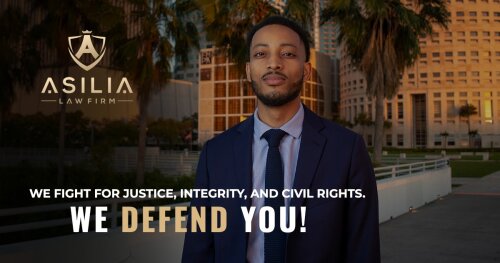Best Constitutional Law Lawyers in Miami
Share your needs with us, get contacted by law firms.
Free. Takes 2 min.
List of the best lawyers in Miami, United States
About Constitutional Law in Miami, United States:
Constitutional Law in Miami, United States refers to the body of laws that govern the interpretation and application of the Constitution of the United States. This includes the rights and responsibilities of individuals, as well as the powers and limits of the government. Miami, being a diverse and dynamic city, often sees cases related to free speech, privacy rights, and equal protection under the law.
Why You May Need a Lawyer:
You may need a lawyer in Constitutional Law in Miami for various reasons, such as defending your constitutional rights in court, challenging a government action or law that you believe is unconstitutional, or seeking compensation for a violation of your constitutional rights. A lawyer can help you understand your rights, navigate the legal system, and advocate on your behalf.
Local Laws Overview:
In Miami, several local laws intersect with Constitutional Law, including ordinances related to civil rights, discrimination, and law enforcement practices. It is important to be aware of these laws and how they may impact your constitutional rights.
Frequently Asked Questions:
1. What are my constitutional rights?
Your constitutional rights include freedom of speech, religion, and assembly; the right to bear arms; the right to due process of law; and protection against unreasonable searches and seizures.
2. Can I challenge a law that I believe is unconstitutional?
Yes, you can challenge a law by filing a lawsuit in court and arguing that it violates the Constitution. A lawyer can help you navigate this process.
3. What should I do if my constitutional rights have been violated?
If you believe your constitutional rights have been violated, you should consult with a lawyer to discuss your options for legal recourse.
4. Can the government restrict my freedom of speech?
The government can place certain restrictions on freedom of speech, such as prohibiting hate speech or speech that incites violence. However, these restrictions must be narrowly tailored and serve a compelling government interest.
5. How can I protect my privacy rights?
You can protect your privacy rights by being aware of the laws governing privacy, such as the Fourth Amendment protections against unreasonable searches and seizures. You can also consult with a lawyer to learn more about your rights.
6. What is the Equal Protection Clause?
The Equal Protection Clause, found in the Fourteenth Amendment, prohibits the government from treating individuals differently based on characteristics such as race, gender, or national origin.
7. Can I sue a government official for violating my constitutional rights?
Yes, you can sue a government official for violating your constitutional rights. However, government officials may have qualified immunity, which can make it more challenging to hold them accountable.
8. How does Constitutional Law apply to law enforcement practices?
Constitutional Law sets limits on law enforcement practices, such as prohibiting unreasonable searches and seizures, ensuring due process of law, and protecting the rights of individuals in custody.
9. What is the Supremacy Clause?
The Supremacy Clause, found in Article VI of the Constitution, establishes that the Constitution and federal laws take precedence over state laws and constitutions.
10. How can I learn more about Constitutional Law in Miami?
You can consult with a constitutional law attorney in Miami, research legal resources online, or visit a local law library to learn more about Constitutional Law in Miami.
Additional Resources:
For more information on Constitutional Law in Miami, you can visit the ACLU of Florida website, contact the Miami-Dade County Bar Association, or explore legal databases such as Westlaw or LexisNexis.
Next Steps:
If you believe your constitutional rights have been violated or if you need legal advice in Constitutional Law in Miami, it is important to consult with a qualified attorney who specializes in this area of law. They can provide guidance on your rights and options for legal recourse.
Lawzana helps you find the best lawyers and law firms in Miami through a curated and pre-screened list of qualified legal professionals. Our platform offers rankings and detailed profiles of attorneys and law firms, allowing you to compare based on practice areas, including Constitutional Law, experience, and client feedback.
Each profile includes a description of the firm's areas of practice, client reviews, team members and partners, year of establishment, spoken languages, office locations, contact information, social media presence, and any published articles or resources. Most firms on our platform speak English and are experienced in both local and international legal matters.
Get a quote from top-rated law firms in Miami, United States — quickly, securely, and without unnecessary hassle.
Disclaimer:
The information provided on this page is for general informational purposes only and does not constitute legal advice. While we strive to ensure the accuracy and relevance of the content, legal information may change over time, and interpretations of the law can vary. You should always consult with a qualified legal professional for advice specific to your situation.
We disclaim all liability for actions taken or not taken based on the content of this page. If you believe any information is incorrect or outdated, please contact us, and we will review and update it where appropriate.









